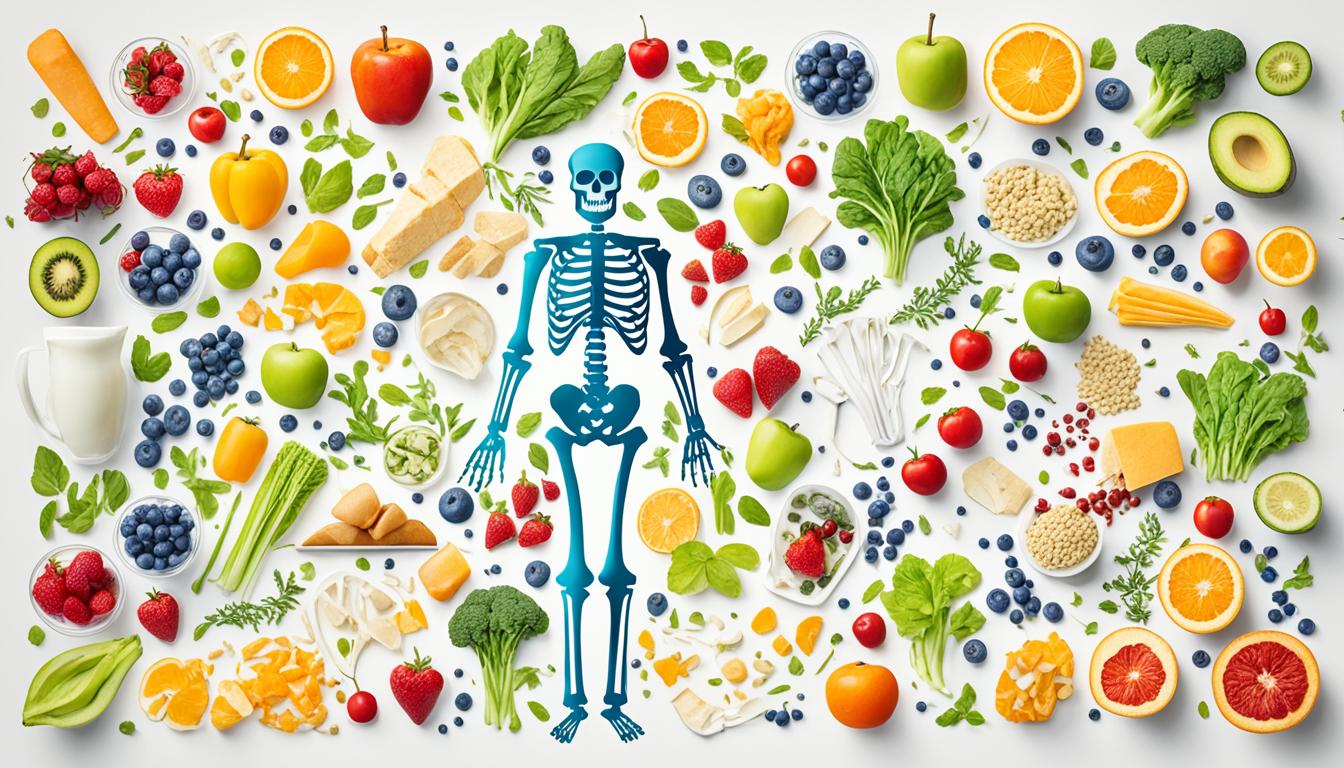Do you know how crucial fitness is for bone health? Regular physical activity is key for everyone aiming to boost their health. As we age, the risk of osteoporosis, a condition that weakens bones, grows. That’s why adding exercises that strengthen bones is crucial. These workouts not only help in improving bone density but also boost muscle strength, balance, and coordination.
It doesn’t matter if you’re young, pregnant, or elderly. Engaging in structured exercises for bone strength is essential for keeping bones healthy over your lifetime.
Key Takeaways
- Regular exercise is essential for maintaining strong bones and muscle mass.
- All adults should aim for at least 150 minutes of moderate-intensity exercise weekly.
- Bone density improvement can significantly reduce the risk of osteoporosis.
- Incorporating weight-bearing activities into your routine is ideal for bone health.
- Health conditions should be considered when determining the exercise regimen.
- Maintaining an active lifestyle benefits both physical and mental well-being.
- Consulting with a healthcare provider ensures a safe approach to fitness during different life stages.
Understanding the Importance of Bone Health
Bone health is crucial for your overall well-being, affecting your mobility, posture, and the risk of osteoporosis. In childhood and adolescence, bones gather vital minerals and nutrients, reaching peak density in early adulthood. However, there’s a natural decline in bone density as you age, making it essential to be aware of this process.
Women often experience a sharp loss of bone mass post-menopause, making it vital to understand the importance of bone health. This decline can lead to a higher risk of fractures. Lifestyle choices, such as excessive alcohol consumption and smoking, can also harm your bone mass, raising the risk of osteoporosis.
Many people don’t realize they might have weak bones. Fractures in areas like the wrist, spine, and hip can have severe consequences, with hip fractures significantly increasing mortality risks within a year. Regular bone density checks are crucial, especially as you age, to stay informed about your bone health.
To fight bone health decline, a proactive approach is key. This involves a diet rich in calcium and vitamin D, along with consistent physical activity. Weight-bearing exercises are particularly beneficial for bone strength, underscoring the role of healthy habits in maintaining bone density.
How Exercise Improves Bone Density
Exercise is crucial for enhancing bone health, offering significant benefits for bones. Regular physical activity boosts bone formation and maintains bone density as you age. Weight-bearing and resistance exercises stimulate bone growth, countering age-related bone mass decline.
A systematic review in Sports Medicine highlights a strong link between exercise and osteoporosis prevention. Active older adults tend to have better bone mass than those who are sedentary. Exercise is particularly beneficial for postmenopausal women, helping to reduce bone loss. The Cochrane Database of Systematic Reviews underscores exercise’s role in preventing and treating osteoporosis in this group.
It’s vital to include various physical activities for strong bones. Weight-bearing exercises and strength training enhance muscle strength and coordination. These activities lower the risk of falls, which is key for bone health. The American College of Sports Medicine recommends a training schedule with strength exercises three times a week for optimal skeletal benefits.
As bone mass peaks by age 25 and then declines, an active lifestyle becomes crucial. A balanced exercise routine helps increase bone mass in youth and maintain it in older age. For more on fitness and heart health, visit this resource.
Best Workouts for Bone Strength
Engaging in the right exercises can significantly enhance your bone health. Weight-bearing exercises are among the best for bone strength. Activities like brisk walking, jogging, tennis, and climbing stairs stimulate bone formation and maintain bone density.

Incorporating recommended exercises for bones into your routine can yield impressive results. For instance, tai chi has been shown to slow bone loss by up to 3.5 times. Regular yoga sessions also improve bone mineral density in the spine, enhancing skeletal health.
Walking is particularly beneficial for bone health. Nurses who walked at least four hours weekly had a 41% lower risk of hip fractures. Therefore, brisk walking is an accessible way to improve bone health.
Muscle-strengthening exercises are also crucial for skeletal health. Aim to perform these workouts 2 to 3 days a week, focusing on movements like squats, deadlifts, and overhead presses. It’s important to use proper weight and technique. Gradually increase weights rather than trying to lift too much too soon.
For those unable to do high-impact workouts, low-impact activities like swimming or cycling are still beneficial. However, they don’t offer the same benefits for bone strength as weight-bearing exercises. Consulting professionals can provide tailored advice to optimize your workouts based on your specific health needs. For more information, check out recommended exercises for bones designed for all fitness levels.
Fitness and Bone Health: The Key Connection
The link between fitness and bone health is profound and complex. Regular physical activity not only fortifies your bones but also boosts your overall health, including mental well-being. Studies reveal that teens who engage in vigorous exercise set the stage for robust bone health, underscoring the significance of an active lifestyle from a young age.
For seniors, adding weighted vests to workouts aids in effective weight loss and bone density maintenance. High-impact exercises like burpees and jumping jacks are pivotal in building strength, enhancing endurance, and aiding in fat loss. This is especially vital for postmenopausal women, as exercise significantly lowers the risk of hip fractures, encouraging a more dynamic lifestyle.
Did you know that 99% of your body’s calcium is stored in bones and teeth? This fact underscores the vital role skeletal health plays in your overall health. Promoting skeletal health through fitness is crucial as you refine your nutritional and exercise habits. Rebekah Rotstein, creator of the Buff Bones® exercise system, champions this connection, offering workshops on Pilates, bone health, and movement education, advocating for an active lifestyle.
Enrolling in such programs yields numerous health benefits of exercise that elevate your life quality. The upcoming webinar series “Let’s Get Moving! Exercise for Brain and Bone Health” is a prime chance to learn how to seamlessly integrate fitness into your daily life. Interacting with experts can motivate you to view fitness as a lifelong endeavor for your bone health.
Nutrition for Stronger Bones
Proper nutrition is vital for maintaining and boosting bone health across your life span. A diet rich in essential nutrients is key to keeping bones strong and healthy. Calcium, vitamin D, and protein are among the most vital nutrients for bone strength.
Incorporating Calcium and Vitamin D
Calcium is the cornerstone of bone health. The daily intake varies with age and gender. Adolescents aged 9 to 18 need about 1,300 mg, while adults aged 19 to 50 require around 1,000 mg. Women over 50 and both men and women over 70 should aim for 1,200 mg. Excellent sources include dairy products, leafy greens, and fortified beverages.
Vitamin D is equally crucial, aiding in calcium absorption. The recommended intake is 600 IU for most, increasing to 800 IU for those over 70. Sunlight, fatty fish, and fortified foods can help meet vitamin D needs, supporting bone health.
The Role of Protein in Bone Health
Protein’s impact on bone density is significant. Research shows a link between higher protein intake and better bone density, especially in older adults. Including protein-rich foods like lean meats, fish, legumes, and dairy can boost bone health. Adequate protein not only aids muscle strength but also supports bone structure.

Essential Exercises for Maintaining Bone Density
Strengthening bones demands specific physical activities designed to boost bone density. A mix of weight-bearing exercises and resistance training is key. These exercises help you make choices that support your bone health.
Weight-Bearing Exercises
Weight-bearing exercises are vital for bone strength. Activities like climbing stairs, jogging, dancing, and weightlifting work your muscles against gravity. This puts pressure on your bones beneficially.
Try adding weights to your walking, doing lunges, and engaging in balanced exercises. Aim for 150 minutes of moderate-intensity exercise weekly, and muscle-strengthening activities twice a week. While swimming and biking are great for the heart, they don’t strengthen bones. For those with osteoporosis, high-impact activities should be approached with caution due to the higher fracture risk.
Resistance Training Benefits
Resistance training boosts bone growth by applying stress, enhancing skeletal health. Focus on muscles linked to common osteoporotic fractures. Exercises like bent-over rows with resistance tubing are effective, requiring one set of 12 to 15 reps.
Balancing exercises like tai chi improve muscle strength, flexibility, and stability. Always consult a doctor before starting a new fitness program, especially if you have health concerns. By doing these exercises, you can lower your osteoporosis risk and enhance your health. Learn more about nutrition for stronger bones.
Promoting Skeletal Health Through Fitness Routines
Embracing a comprehensive fitness routine can significantly contribute to your skeletal health. By integrating various activities into your regimen, you can effectively support bone strength and overall well-being. Two vital components of such a plan are aerobic activities for bone health and balance exercises for preventing falls.
The Impact of Aerobic Activities
Aerobic activities for bone health play a crucial role in enhancing cardiovascular fitness, which indirectly fosters better bone density. Activities like brisk walking, swimming, and cycling are excellent choices. As you engage in these exercises, your body experiences muscle contractions that help stimulate bone remodeling and support healthy bone structure. Regular participation in these aerobic exercises builds endurance and promotes a more active lifestyle, essential for maintaining bone integrity as you age.
Balance Exercises for Fall Prevention
Incorporating balance exercises for preventing falls can be transformative, particularly for older adults. Stability workouts, tai chi, and simple standing exercises improve your proprioception and coordination. These activities significantly lower the risk of falls, a common concern among those with reduced bone density. The combination of balance training with aerobic activities creates a holistic approach, ensuring you not only maintain but enhance your skeletal health over time.
Guidelines for Effective Bone-Boosting Fitness
To maintain and enhance your bone health, guidelines for fitness and bone health stress the need for regular physical activity. Aim for at least 150 minutes of moderate-intensity exercise weekly. Include exercise recommendations for strong bones that involve muscle-strengthening activities twice a week. These routines can significantly improve bone density.

Older adults should focus on balance exercises to lower the risk of falls. It’s essential to tailor your workout to your abilities. Consulting with healthcare providers can provide personalized advice to support your bone health at every life stage.
Weight-bearing exercises like walking and jogging are crucial for building strong bones. A holistic approach that combines proper nutrition, adequate calcium intake, and vitamin D is equally vital. Adhering to these guidelines will boost both your fitness and bone health effectively.
Conclusion
Boosting your fitness and bone health is crucial for everyone, regardless of age or background. It’s vital to understand how nutrition and exercise are linked. This knowledge lets you make choices that help strengthen your bones. A holistic approach to bone wellness can greatly improve your life quality, with diet and exercise being key to maintaining and boosting bone density.
A 10 percent increase in bone mass can cut fracture risk by up to 50 percent. This highlights the critical role of regular exercise. By choosing thoughtful exercise routines and balanced nutrition, you’re not just strengthening your bones. You’re also preparing for the natural changes that come with aging.
Adopting a strategy that includes weight-bearing activities, resistance training, and proper nutrition is essential. This is especially true during key life stages like adolescence. Such choices lay the groundwork for lasting bone health. By focusing on these lifestyle habits now, you’re setting the stage for a healthier, more active future. This approach reduces the risk of osteoporosis and enhances overall well-being.
FAQ
Why is bone health important at any age?
What exercises are best for strong bones?
How can I maintain my bone density as I age?
What is the link between exercise and osteoporosis?
How often should I exercise to promote bone health?
What role does nutrition play in bone health?
Can exercising improve my overall health beyond bone strength?
Are there specific exercises for fall prevention?
What should I do if I have an existing bone condition?
Source Links
- Exercise for Your Bone Health – https://www.niams.nih.gov/health-topics/exercise-your-bone-health
- Exercise and Bone Health – OrthoInfo – AAOS – https://orthoinfo.aaos.org/en/staying-healthy/exercise-and-bone-health/
- Bone Health and Osteoporosis: What It Means to You – https://www.niams.nih.gov/health-topics/surgeon-generals-report-bone-health-and-osteoporosis-what-it-means-you
- May 2024 – Know Your Bones – https://www.fda.gov/consumers/knowledge-and-news-women-owh-blog/know-your-bones
- Exercise & Bone Health | Exercise For Bones – https://healthybonesaustralia.org.au/your-bone-health/exercise-bone-health/
- The Effectiveness of Physical Exercise on Bone Density in Osteoporotic Patients – https://www.ncbi.nlm.nih.gov/pmc/articles/PMC6323511/
- How Exercise Can Help You Build Better Bones – https://www.hss.edu/article_exercise-for-bone-health.asp
- Weight-Bearing Exercise: 8 Workouts for Strong Bones – https://www.webmd.com/osteoporosis/features/exercise-weight-bearing
- Exercise for bone health – https://theros.org.uk/information-and-support/bone-health/exercise-for-bones/
- Bone Health Archives – IDEA Health & Fitness Association – https://www.ideafit.com/personal-training/anatomy-kinesiology/bone-health/
- Let’s Get Moving! Exercise for Brain and Bone Health – https://states.aarp.org/colorado/lets-get-moving-exercise-for-brain-and-bone-health
- Calcium, Nutrition, and Bone Health – OrthoInfo – AAOS – https://orthoinfo.aaos.org/en/staying-healthy/calcium-nutrition-and-bone-health/
- Food for healthy bones – https://www.nhs.uk/live-well/bone-health/food-for-strong-bones/
- Living with Osteoporosis: 8 Exercises to Strengthen Your Bones – https://www.healthline.com/health/managing-osteoporosis/exercises-to-strengthen-your-bones
- Exercising with osteoporosis: Stay active the safe way – https://www.mayoclinic.org/diseases-conditions/osteoporosis/in-depth/osteoporosis/art-20044989
- Bone Health & Exercise, Menopause Management Tips – https://www.menopause.org/for-women/menopauseflashes/bone-health-and-heart-health/bone-health-exercise-is-a-key-component
- Physical Activity and Bone Health – https://www.ncbi.nlm.nih.gov/pmc/articles/PMC6179512/
- Regulation of bone health through physical exercise: Mechanisms and types – https://www.ncbi.nlm.nih.gov/pmc/articles/PMC9768366/
- How to keep your bones healthy – https://www.mayoclinic.org/healthy-lifestyle/adult-health/in-depth/bone-health/art-20045060
- Osteoporosis – Prevention – https://www.nhs.uk/conditions/osteoporosis/prevention/
- Determinants of Bone Health – Bone Health and Osteoporosis – https://www.ncbi.nlm.nih.gov/books/NBK45503/
- Bone Health In Brief – https://lpi.oregonstate.edu/mic/health-disease/bone-health-in-brief


